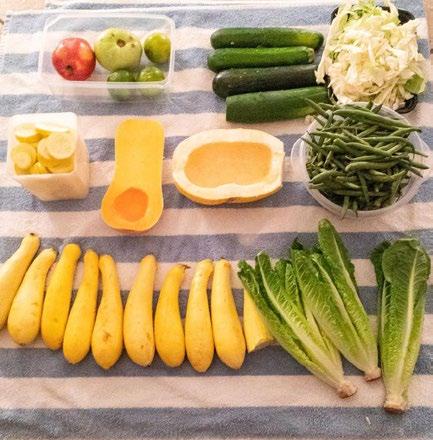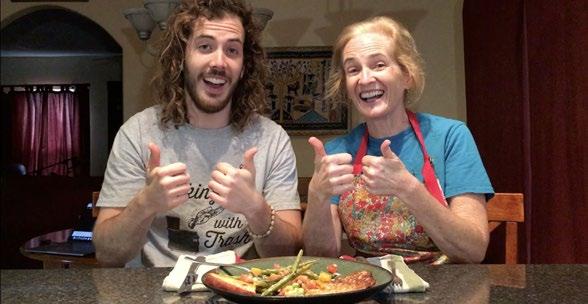
6 minute read
Diving for Treasure
In the dark of the night, Cameron Macleish grabs his flashlight and crate, ready to carry out his work. He stops his van and approaches a large dumpster, hurdling himself over the edge and into the pile of trash inside. While many people would look on in horror, Cameron knows there’s a good possibility he’ll strike gold.
If you haven’t guessed already, Cameron is a dumpster diver. As he sifts through the mounds of garbage, he finds plenty of discarded food. Only a lot of the time, most of it is entirely edible. It’s a dirty little secret where the problem of food waste is concerned.
“My initial reaction was, ‘what the heck am I doing? This is disgusting,” Cameron says as he recalls his introduction to ‘diving’. “And then, when I opened up the dumpster for the first time, I was just blown away. It was literally like opening a treasure chest; you find all this perfectly good food.” Dumpster diving is a gamble; you never know what you’re going to find. Some nights, Cameron will strike out on every single trash can he hits. Other times, he walks away with a week’s worth of meals. Regular finds include fresh artisanal bread, fruits, vegetables, meat, dairy, and spices. Beyond food, he’ll also gather brand new clothing items, shoes, pet supplies, and even furniture.
The world has a severe waste issue, and everyone is at fault.
We live in a consumer-driven, throwaway society. People often buy too much and let the food spoil. The David Suzuki Foundation says best before dates on packages are also a driving force behind the world’s food waste problem. For example, yogurt with a best before date of today is safe to eat for another seven to 10 days. Best before dates are not to be confused with an expiration date; they refer to the product’s peak freshness, and not to its quality or safety.
“This is a major issue that we are facing, and really, nobody knows about it,” he says. “I believe we have become disconnected from the food system [...] In the U.S., people don’t think there is a crisis. Nearly 40% of the food that’s being produced is being wasted on a yearly basis. This is ridiculous. How many Americans are food insecure?”

Food found during one of Cameron's dives.
According to the United States Department of Agriculture (USDA), 11% of American households were food insecure at some point during 2018. In Canada, research by PROOF finds 1 in 8 families struggle to put food on the table; and in the U.K., the FAO estimates that 2.2 million people face the same challenges.

The First Time
A resident of Florida, Cameron first contemplated dumpster diving while going to school in London, England. He noticed grocery stores carting loads of food to the garbage at the end of the day, and he asked store managers if he could make use of it instead. Liability issues always made that impossible.
“I know where they are taking this food. What’s stopping me from going into the dumpster and grabbing it?” Cameron remembers thinking. “But I didn’t have the courage at the time.”

One of Ellens 100% dumpster-certified creations
He finally took the plunge while backpacking through Australia and New Zealand, feeding himself three square meals a day off the food other people had carelessly discarded. Upon his return to the U.S., he discovered the dumpsters in his home country were also overflowing with treasures. “It’s one thing to create awareness, like these climate strikes that are happening,” Cameron says. “But at some point, we need to stop waiting for somebody to solve it. If you have the capacity, then you should go for it.”
And so, he decided to do something about it.

Guajillo Citrus Plantains with a micro basil garnish
Not Your Average Cooking Show
Cameron’s mother, Ellen, is a sous-chef in the Florida area, and together, they have created a YouTube series called Cooking with Trash. Every episode begins with Cameron searching through commercial trash containers for food. He takes what he finds back to his mother, who makes it into a gourmet, 100% dumpster-certified meal.

While the idea may turn many stomachs, the entertaining, eye-opening episodes feature some delicious and innovative dishes. Think frittatas with butternut squash and avocado sauce; bagel tacos with sweet potatoes and ground beef; peach cobbler with a cashew nut crust; and vegetable and mozzarella quiche, to name just a few of the recipes.
Of course, not all of the food collected from a dumpster is going to be edible, and Cameron always avoids items covered with unidentifiable substances or meat and dairy that have changed colors and whose packages have started to bloat.
In one episode, Cameron comes back from his most successful dive yet with crates full of asparagus, peppers, onions, squash, grapes, pomegranates, eggs, cheese, flour, and so much more. He estimates the loot is worth about $123. But it’s not all about the money.
“My mindset has shifted; it’s almost like an obsessive-compulsive disorder,” he says. “I can’t let that food go to waste.”
Cameron also donates a lot of the wasted items he collects to various charities and food banks. Always honest about where it comes from, he says some organizations take it; others don’t.
The cooking show is just the beginning. Cameron is currently working with charitable organizations to launch a fleet of food trucks across the country. He’s designing his business plan, but essentially, unwanted food will be collected from various grocery chains and farms. A creative chef with the ability to improvise based on the donated items will then prepare meals to be delivered to people living in food deserts.
Any food scraps leftover on the trucks will be brought to organic farms for compost. Cameron is hoping to eventually plant community gardens where people can be educated on how to grow food. It’s a circular economy at its best.
Officially registered as a non-profit in the state of Florida, a team of attorneys is currently guiding Cameron through the process of obtaining charity status so he can receive food donations. If all goes according to plan, he hopes to have his business up and running by the end of 2020.
For The Aspiring Divers
While the act of collecting food from a garbage can is simple enough, Cameron warns aspiring dumpster divers to be extremely cautious. Beyond potential food safety issues, people need to be aware of the laws where they are diving. He recommends wearing long pants, shirts, and headlights, and warns there are often sharp objects hidden in the trash heap.
Cooking with Trash and Cameron’s business vision aim to give power back to the people. But he admits that not all fellow dumpster divers are happy about him exposing the ugly truth sitting at the bottom of the world’s trash bins.
“What’s more important?” he says in response to any criticism he receives. “Your hobby, or ending food waste and potentially rerouting [it and feeding] the food insecure?”
It’s hard to argue with that.
Find Cooking with Trash:
• YouTube: bit.ly/32tTYNW • Instagram: @cookingwithtrashshow • Facebook: facebook.com/CookingWithTrash










